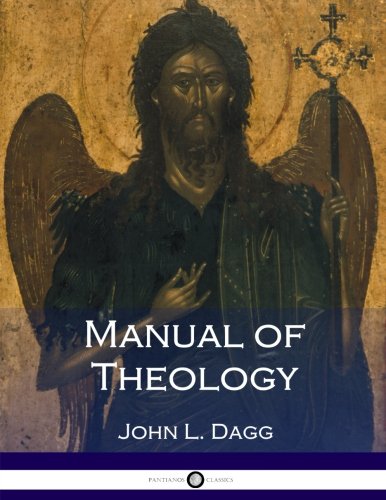Author: John L. Dagg
Publisher: CreateSpace Independent Publishing Platform
Paperback:
ISBN 10: 1975710215
ISBN 13: 978-1975710217
John L. Dagg's guide to theology offers superb spiritual insight from the viewpoint of a senior preacher and theologian of the American Baptist movement.
As Dagg's masterwork, the Manual of Theology contains honest and practical guide to the many aspects and qualities of Bible theology. Perhaps significantly, Dagg opens his great work with a chapter on inspiration - the fact that God inspired and communicated the Bible, and why all Christians should acknowledge this truth if they are to understand His guidance in their lives.
Dagg also discusses the individual Christian life and soul. The penalty of losing one's soul, if indeed one sins to such an extent as to be distant from the Lord, is confirmed to be the worst any person may suffer. However, Dagg continues on a more hopeful note: one's soul can be redeemed and saved, although the numbers of souls to have gained such redemption is only small.
The avoidance and repentance of sin is a further topic which occupies much of Dagg's reflection. What sin is, and how we must escape its clutches to lead a virtuous existence, is discussed. Dagg explains various attributes of forgiveness from God; why it is required and why we should strive for it should we ever stray from the path of good and righteous deeds. Following on from this, Dagg explains how the Christian's mission in life is justified by his desire for peace, joy and harmony for himself and others.
Several chapters of this book are devoted to Jesus Christ, and the significance of His actions in life and the symbols which are associated with His being. The cross is explored in depth as a deeply significant object of sacrifice for one's faith, whilst Christ's ability to save mortals who have been condemned for their sins is detailed.
In all, John L. Dagg's Manual of Theology offers a thorough and excellent guide to the major traits and doctrines of the Christian faith, that believers may aspire to greater harmony with themselves and God. Dagg's language is plain and forthright, and his capacity for explanation so significant that to name this work a classic of Christianity is no exaggeration.
This edition of the Manual of Theology includes all of the original notes, which are appended after the paragraphs which they occur. This allows readers to contemplate both the learned sentiments of the work, and associated thoughts and sources which Dagg draws on in order to bless us with his insight and knowledge.
Publisher: CreateSpace Independent Publishing Platform
Paperback:
ISBN 10: 1975710215
ISBN 13: 978-1975710217
John L. Dagg's guide to theology offers superb spiritual insight from the viewpoint of a senior preacher and theologian of the American Baptist movement.
As Dagg's masterwork, the Manual of Theology contains honest and practical guide to the many aspects and qualities of Bible theology. Perhaps significantly, Dagg opens his great work with a chapter on inspiration - the fact that God inspired and communicated the Bible, and why all Christians should acknowledge this truth if they are to understand His guidance in their lives.
Dagg also discusses the individual Christian life and soul. The penalty of losing one's soul, if indeed one sins to such an extent as to be distant from the Lord, is confirmed to be the worst any person may suffer. However, Dagg continues on a more hopeful note: one's soul can be redeemed and saved, although the numbers of souls to have gained such redemption is only small.
The avoidance and repentance of sin is a further topic which occupies much of Dagg's reflection. What sin is, and how we must escape its clutches to lead a virtuous existence, is discussed. Dagg explains various attributes of forgiveness from God; why it is required and why we should strive for it should we ever stray from the path of good and righteous deeds. Following on from this, Dagg explains how the Christian's mission in life is justified by his desire for peace, joy and harmony for himself and others.
Several chapters of this book are devoted to Jesus Christ, and the significance of His actions in life and the symbols which are associated with His being. The cross is explored in depth as a deeply significant object of sacrifice for one's faith, whilst Christ's ability to save mortals who have been condemned for their sins is detailed.
In all, John L. Dagg's Manual of Theology offers a thorough and excellent guide to the major traits and doctrines of the Christian faith, that believers may aspire to greater harmony with themselves and God. Dagg's language is plain and forthright, and his capacity for explanation so significant that to name this work a classic of Christianity is no exaggeration.
This edition of the Manual of Theology includes all of the original notes, which are appended after the paragraphs which they occur. This allows readers to contemplate both the learned sentiments of the work, and associated thoughts and sources which Dagg draws on in order to bless us with his insight and knowledge.


